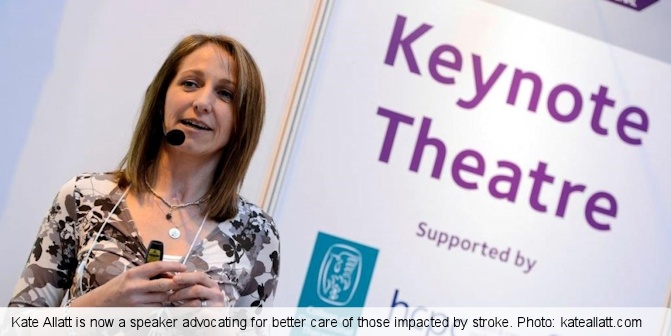Kate Allatt suffered a stroke in 2013 when she was 39 years old. The mother of three (ages 11, 9, and 6) ran 70 miles a week and was actively involved in her children’s lives. After a few weeks of headaches, a doctor misdiagnosed her with migraine and sent her home with pain killers. Five hours later, the blood clot that had all the while been accumulating in her brain stem caused her to suffer a massive stroke. For the next ten days, Allatt was in a medically-induced coma, and the entire time she experienced a terrifying condition called Locked-In Syndrome.
“Locked-In Syndrome is like being buried alive,” Allatt told the Daily Mail. Her medical staff were completely unaware of Allatt’s condition, and made treatment decisions under the assumption that she was “brain-dead.” Her doctors even prescribed opiates to treat her pain based on this assumption, and these caused Allatt to have horrific hallucinations since her brain was functioning. “You can think, you can hear, you can feel, but you can communicate absolutely nothing.”
Since her horrific experience Allatt has been outspoken about the maltreatment she received from hospital staff who assumed her brain was not functioning, and the possible lack of procedural testing during her hospitalization that may have helped to inform her caregivers that she was not “brain-dead.” In fact, far from being a hopeless cause, Allatt has since made a full recovery.
During her ten comatose days, Allatt recalls being embarrassed and offended by the way hospital staff treated her. The Daily Mail reports:
‘There were nurses that spoke over me. They lowered their expectations of me.’ ‘It’s fair to call me a control freak so to be in that situation is awful.’ ‘I’d be left on my shower seat for 20 minutes after a shower, naked.’ ‘I wasn’t saved the embarrassment. The indignity is there and it’s horrible, so mortifying.
Allatt strongly advocates the routine tests that are supposed to be performed on patients in comatose situations:
Doctor’s are meant to do the Glasgow Coma Scale Test, which checks consciousness. Did they do that enough? Were there enough scans to check for brain activity?
Two weeks passed before Kate was able to tell people that she was not brain-dead. She recalls that her oldest daughter was the only person who treated her like she was conscious of her surroundings:
‘India was only ten but she sat at my bedside and babbled away, talking about her homework and absolutely anything for 45 minutes straight as if nothing was wrong. Just talking to her mum. I didn’t know until later, but after 45 minutes talking to me, she went outside and threw up everywhere in complete shock in the waiting room. It was so hard to hear that… The roles were reversed, like the kids were my parents and I was the baby,’
Today, Allatt is an author who advocates for patients with Locked-In Syndrome. Resilient in every way, Allatt has even been able to make light of her experience by writing a book sharing the humorous moments that occurred during Locked-In Syndrome (for example, she says that her brain thought she was at some kind of party while she was at the hospital and everyone was coming to see her).
Finally, after two weeks, Kate was able to express to those around her that she was not brain-dead. Little by little she made movements and began to communicate. The most horrific part of Kate’s journey was hearing that those around her thought her prognosis was hopeless, and that removing her from life support was an option. “The doctors kept me alive and thank God they did, I’m very grateful.”







